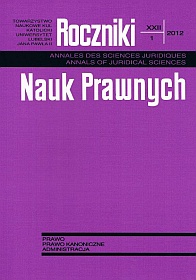Secular Institutes in the Light of Theological and Legal Documents of the Church
Abstract
This article is an attempt to bring closer the reality of secular institutes on the basis of teaching of the Church. To meet the purpose, it was necessary to collect the source material. The first part of this article outlines the historical background and development of the institutes over the centuries when the desire of secular life in consecration could be seen. Ancient desires of various Associations had been summarized in the apostolic constitution Provida Mater Ecclesia. Since then, the institutes obtained their formal justification. Subsequent years released the following documents which were explaining the reality of institutes. With the beginning of Vatican Council great expectation in the sphere of secular life appeared. The Council directed the Church’s attention to the position of lay members in it. The Code of Canon Law stated this form of life in can. 710-730.
The previous understanding that the consecration is related only with the religious state was supplemented by the chance of experience consecration in the world. The vocation to life due to the evangelical counsels in the modern world became the subject of reflection in the second part of this article that represents individual characteristics of both secular and clerical institutes as the necessary elements of this form of life. It follows that the vocation of members of secular institutes is not the avoidance of the world but conscious and responsible duration in it, as well as the transformation of the world through work, rest and the witness as leaven of the gospel. It follows that the universal vocation to evangelization, related to the call to holiness, is special task for consecrated seculars. Therefore, apostolate in the world is nothing like transforming it from the inside and remaining spirited member of the Church community.
This article reveals the history of creating the God’s works which are secular institutes, as well as indicates the need to disseminate this form of life among seculars. The article doesn’t display whole richness which are the institutes for the present-day Church. Nevertheless, through the presentation of the phenomenon of consecrated secularity in secular institutes and its legal features, the Author wished to encourage a greater interest in this form of life and to deepen knowledge on this topic.
Copyright (c) 2012 Roczniki Nauk Prawnych

This work is licensed under a Creative Commons Attribution-NonCommercial-NoDerivatives 4.0 International License.


